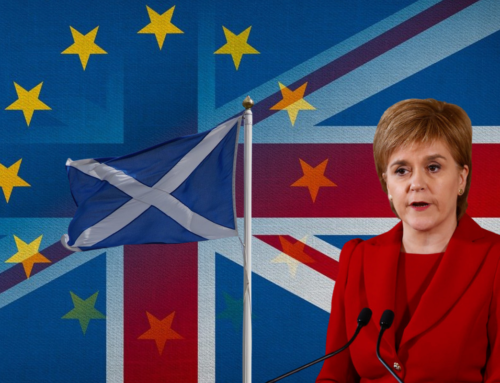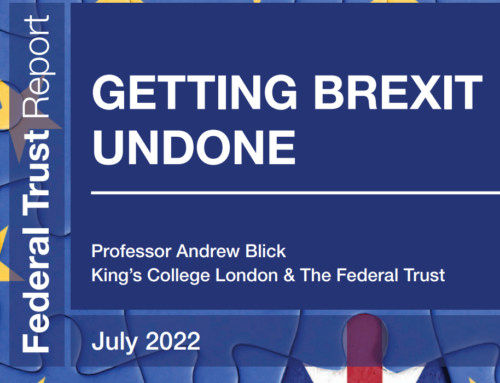by Brendan Donnelly
First published on the European Movement Blog
The European Elections are sometimes described by academics and other observers as “secondary” elections, in which the electorate take little notice of the European policies or claimed achievements of those standing for election, but simply express their (often unfavourable) judgements on the domestic policies of the parties contesting the European Elections. That may well be an accurate description of the frame of mind in which many British electors approach the Elections. But this year’s European Elections will nevertheless have considerable implications for the way in which the European Union will be governed over the next five years; and similarly important implications for British domestic politics.
A striking innovation of the Lisbon Treaty was the greater role assigned to the European Parliament in the nomination of the President of the European Commission who will take up office later this year. The main political groupings in the Parliament have put forward their favoured candidates for this post and a number of debates between them have been held or will be held before the elections take place later this month. Although the interest of British voters and politicians in this new aspect of the European Elections has been limited, it is a significant development in the life of the European Union. It will no longer be possible to argue that the European Elections make no difference to the way in which Europe is run. The new Parliament is likely to insist moreover on making its voice heard forcefully in the nomination of individual Commissioners and perhaps even the new President of the European Council. The European Parliament is the only body capable of acting as the democratic representative of the European Union’s voters as whole. It can only be to the good that the European Elections will better reflect this task in future.
It is sometimes claimed that the European Parliament likely to be elected in 2014 will be radically different from its predecessors, with a much larger Eurosceptic component in its membership. This claim has some validity, but it should not be overstated. There are some countries, such as the United Kingdom and France, that will probably send later this month a substantial contingent of Eurosceptic MEPs to Brussels, Others, such as Spain and Germany, will send few or none. The substantial majority of Members of the European Parliament after 2014 are likely to come from political parties supportive of the European Union and indeed of the Eurozone as currently constituted. It will be much easier for these members to work together across party dividing lines in the Parliament than it will be for the representatives of Eurosceptic parties. There is an existing tradition of consensual politics in the European Parliament between the centre-right and the centre-left, which is likely to continue in the next Parliament. On the other hand, it is impossible to imagine UKIP working closely together with the Front National from France, and only marginally less difficult to imagine either working together with the Italian Five Stars movement.
It has been suggested in the United Kingdom that the European Parliament elected in 2014 will be more sympathetic than its predecessors to British Conservative ideas about the future of the European Union. This may be marginally so, but will in any event hardly be politically decisive for Mr Cameron’s prospects of renegotiating the terms of British membership of the European Union. It will overwhelmingly be with the governments of the other member states rather than the Parliament or Commission that this possible renegotiation will be conducted.
More generally, the European Elections are more likely to bring problems rather than comfort to Mr. Cameron. Opinion polls suggest that his Party will finish third, after the Labour Party and UKIP, either of whom may finish first. Many in his party will probably be pressing him to respond to UKIP’s likely success by adopting more of the latter’s policies. He will also be confronted after the Elections with the difficult question of the political grouping in the European Parliament with which Conservative MEPs should sit. Some Conservative MEPs would like to sit with the newly-formed “Alternative for Germany.” Mrs. Merkel has made it clear that she would regard any such decision as a distinctively unfriendly act.
Most significantly from a domestic point of view, the results of the European Elections may well have in the medium term a definite influence on the result of the Scottish referendum in September. Many commentators plausibly argue that a vote in the European Elections making more likely British exit from the European Union would help the Scottish Nationalist cause, reducing the already diminishing Unionist lead shown by current opinion polls in Scotland. There would certainly be some members of Mr Cameron’s party who would welcome a Scottish secession from the United Kingdom, the consequence of which would be (they hope) a long guaranteed period of Conservative rule in England and Wales. As the head of the United Kingdom’s government, Mr Cameron can scarcely be expected to share such views. He may well however have confronted in his innermost thoughts sometimes at least the possibility that under his Premiership the United Kingdom will leave the European Union and Scotland will in parallel leave the United Kingdom. Neither are outcomes he wishes to achieve. Neither outcome however can be excluded.






